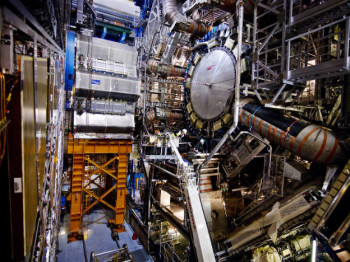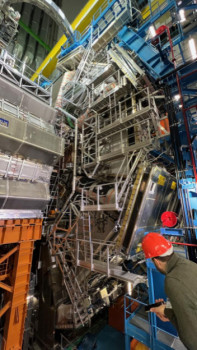News
Queen Mary Physicists Share 2025 Breakthrough Prize in Physics
Centre for Fundamental Physics Faculty of Science and Engineering12 April 2025
Physicists at Queen Mary University of London are celebrating this week after being named among the winners of the prestigious 2025 Breakthrough Prize in Fundamental Physics.
The award honours the global scientific collaborations behind the ATLAS, CMS, LHCb and ALICE experiments at CERN's Large Hadron Collider (LHC) in Geneva, Switzerland – the largest and most powerful particle accelerator in the world.
It recognises the collaborations' "detailed measurements of Higgs boson properties confirming the symmetry-breaking mechanism of mass generation, the discovery of new strongly interacting particles, the study of rare processes and matter-antimatter asymmetry, and the exploration of nature at the shortest distances and most extreme conditions."
The Particle Physics Research Centre at Queen Mary has played a leading role in the ATLAS experiment over the past 30 years, with major contributions to both the construction and data analysis sides of the project. Eram Rizvi, Marcella Bona, Ulla Blumenschein, Seth Zenz, Adrian Bevan, Steve Lloyd, Ian Dawson, and Jon Hays form the core of the ATLAS team at Queen Mary, working alongside a group of 9 PhD students and 12 postdoctoral researchers, engineers, and technicians.
Professor Peter Hobson was also part of the CMS collaboration for nearly 25 years, contributing to the development and commissioning of vital detector technologies.
As part of the prize, the $1 million awards to ATLAS and CMS have been donated to the CERN & Society Foundation, supporting PhD students to conduct research at CERN.
Professor Eram Rizvi who leads the group said: "It's great to see the work of all our collaborators and our own team recognised in this way. The prize will help us continue to push the boundaries of fundamental physics and our understanding of the universe."
Queen Mary researchers have been instrumental in building high-precision silicon detectors used to measure the paths of subatomic particles created in LHC collisions. They also developed components of the ATLAS data acquisition system, which rapidly filters enormous volumes of data – up to 60,000 gigabytes per second – to capture the most interesting events for analysis. Their work has led to world-first measurements of fundamental particles, including the W boson at record energy levels, and ongoing efforts to detect dark matter and study rare Higgs boson decays using advanced machine learning techniques.
The 2025 Breakthrough Prize also celebrates the ongoing scientific output of the ATLAS and CMS experiments, which jointly announced the discovery of the Higgs boson in 2012. This breakthrough led to the 2013 Nobel Prize in Physics for Peter Higgs and François Englert, and a previous Special Breakthrough Prize for the ATLAS and CMS teams.
The ATLAS experiment involves around 3,000 scientists from 177 institutions across 40 countries. The CMS experiment is even larger, with over 5,000 collaborators worldwide. Together, these teams are exploring the deepest questions in physics – the nature of dark matter to the imbalance between matter and antimatter in the universe.
The current data-taking run at the LHC will continue until summer 2026, after which the collider will undergo an upgrade to enter its high-luminosity phase. This next chapter, starting in 2030, will enable physicists to probe rare processes with unprecedented precision and further test the Standard Model of particle physics. Operations are expected to continue into the 2040s.
Our Particle Physics Group is part of the global team awarded the 2025 Breakthrough Prize in Fundamental Physics
The prize recognises the ATLAS, CMS, LHCb and ALICE collaborations at CERN's Large Hadron Collider for landmark contributions to our understanding of the universe – including confirming how particles acquire mass, discovering new particles, and probing the nature of matter and antimatter.
At Queen Mary, our physicists have spent three decades helping design, build and operate the ATLAS experiment, contributing cutting-edge technologies and data analysis techniques. From developing high-precision detectors to using AI to search for dark matter, the team continues to push the boundaries of fundamental science.
Congratulations to everyone involved – a proud moment for particle physics, and for Queen Mary!
#BreakthroughPrize #ParticlePhysics #CERN #ATLAS #CMS #ScienceNews #STEM #QuantumUniverse #QueenMaryUniversity #ProudToBeQMUL
Updated by: David Lockwood






